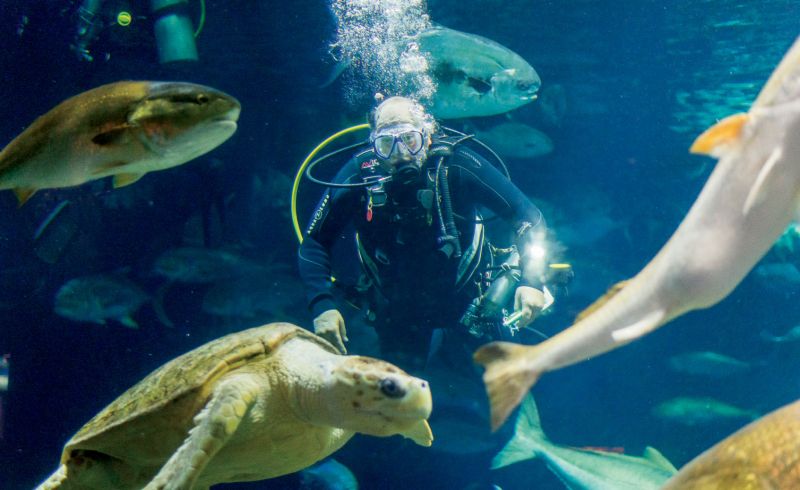
When Charlie and Sherry Fox feel passionately about a particular cause, they don’t just get their feet wet—they plunge right in. Here in the Lowcountry, he’s worked with the Charleston County Volunteer Rescue Squad, federal disaster response unit SC1 Disaster Medical Assistance Team, and the Lowcountry Medical Reserve Corps; she sinks her energy into human trafficking awareness nonprofit Doors to Freedom and the Edisto Beach State Park sea turtle patrol.
And since the South Carolina Aquarium opened 16 years ago, these husband-and-wife philanthropists have together logged more than 8,700 hours as volunteer divers in the facility’s 42-foot-deep Great Ocean Tank. “The aquarium is unique in that its mission statement expresses the importance of education and conservation,” says Sherry, whose love for animals initially drew her to the organization. “Over the years, I have witnessed an increase in our guests’ desire to know and understand how to better conserve and protect our earth, as well as all who share it.”
During the couple’s twice-monthly eight-hour shifts, they interact with dive-show audiences using underwater communication equipment, scrub algae off rocks, vacuum the tank floor and clean its windows, and prep roughly 65 pounds of food for some 350 indigenous fish. Charlie likens their job to caring for a small home aquarium, only on a 385,000-gallon scale.
While volunteer diver duties are primarily behind-the-scenes, the Foxes especially enjoy connecting with the curious patrons who peer into the two-story tank and seem to be transported oceans away. “Diving the Great Ocean Tank is similar to diving offshore—you expect to see sharks, eels, barracuda, sea turtles, and other marine animals and reefs,” explains Charlie, a retired Army National Guard Lieutenant Colonel who completed his advanced open-water training in 1992 with daughter Jennifer.
“Scuba diving with pelagic life is extraordinary and exciting,” agrees Sherry, who earned her credentials in ’95. “Through this work, I hope to impress upon the community the importance of protecting all species. We cannot afford to see another living creature become extinct.”